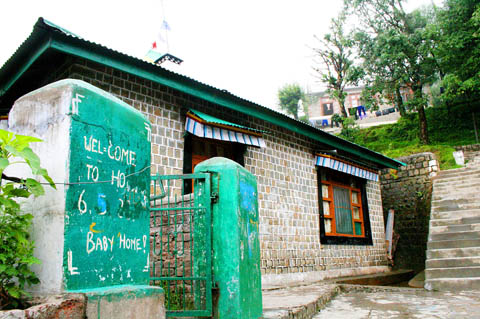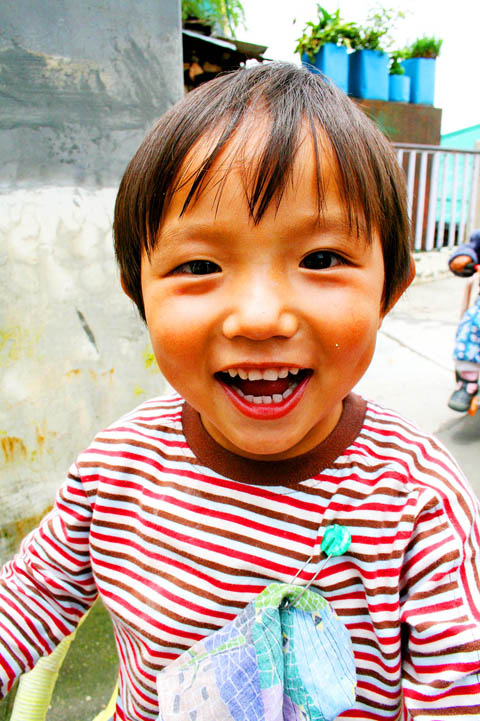Life in exile may be difficult, but love from around the world has made it a little easier for Tibetans.
For nearly half a century, foreign aid — from medical assistance to agricultural programs and shelter for children — has played an important role in Tibetans’ life in exile.
Taiwan has been just such a donor.

PHOTO: LOA IOK-SIN, TAIPEI TIMES
Walking into the Tso-Jeh Khangsar Hospital in the Tibetan settlement in Bylakuppe, India, an ambulance is parked in the courtyard with the words “Donated by the Love and Care Committee, Taiwan, through the Deparment of Health, Central Tibetan Administration” written on it.
Phakmo Tso, the only full-time doctor at the hospital, stood in the courtyard and greeted her guests — a delegation from the Taiwan-Tibet Exchange Foundation (TTEF) — giving each a white khata, a silk scarf used by Tibetans to greet or show respect to someone. The delegation then handed Tso a few boxes with small disposable medical supplies.
“We have been here several times and we always bring medical supplies when we visit,” said Own Su-jei (翁仕杰), the foundation’s deputy secretary-general.

PHOTO: LOA IOK-SIN, TAIPEI TIMES
On his most recent visit last year, Own brought something much bigger than medical supplies: He was there to inaugurate a new wing of the hospital donated by the TTEF and the International Cooperation and Development Fund, Taiwan (ICDF-Taiwan).
“Love from Taiwan: the general in-patient ward, eye operation theatre, education hall and staff quarters are donated by ICDF-Taiwan and Taiwan-Tibet Exchange Foundation,” a stone plaque embedded in the wall at the entrance of the new wing reads. “Furniture and equipment donated by Dr Raffaella France Chionna and Italian friends.”
“We’ve had medical and agricultural aid programs for [Tibetans in exile] since 2004,” Own said. “During the first two years, we provided first aid, dentistry and pediatrics training to physicians from [the southern Indian State of] Karnataka in first aid.”
Own said they had picked Karnataka because the state counts five Tibetan settlements — including Bylakuppe — with approximately 40 percent of the exiled Tibetan population.
Later, the TTEF learned from the Tibetan government in-exile that it wished to upgrade the hospital in Bylakuppe, but lacked money, Own said.
“So we asked ICDF for help and built the new wing with them,” Own said, adding that the project had cost 4.5 million Rupees (US$104,000).
Thanks to the new building and equipment, the hospital is now capable of meeting the medical needs of more patients.
“In the past, we could at the most take 40 patients a morning. Now, we can see 50 to 60 patients,” Tso said, adding that more than 80 eye surgeries have been carried in the new eye operation theater so far.
“Since the hospital’s reputation has spread by word of mouth, we usually have more Indian patients than Tibetans. Some of the patients even came from afar,” she said.
Away from Bylakuppe, more than 2,000 Tibetan children in Dharamsala are able to have a home because of aid from around the world.
“We have 2,069 children living here,” Phuntsok Namgyal, director of the Tibetan Children’s Village (TCV) in Dharamsala, said.
“Most of the children here are those who escaped from Tibet. Only a few are from Tibetan families in nearby communities and settlements who are enduring difficulties and cannot take care of their children,” he said.
The TCV was founded one year after the failed 1959 Tibetan uprising against Chinese rule to provide care for refugee children who were on their own.
Even today, some Tibetan parents are unable to leave China, but want their children to grow up in freedom and send their kids across the Himalayas.
Children in the 10th grade or younger stay in houses with two rooms — one for 12 boys and the other for 12 girls.
“These houses are like family homes,” Phuntsok said. “Each house is headed by TCV staff who act like their parents.”
Aside from providing shelter for the children, the TCV also teaches basic manners and etiquette to the children, such as brushing their teeth everyday and always carrying handkerchiefs.
Once they reach 11th grade, the children are moved to hostels nearby, Phuntsok said.
However, the TCV is not just a home for Tibetan children.
“We actually have schools on campus for the children,” Phuntsok said.
In addition to the TCV in Dharamsala, four other TCVs can be found across India and more branch institutions under the TCV have been launched, including seven residential schools, six day schools, nine daycare centers, four vocational training centers, three youth hostels and three homes for the elderly.
The TCV even plans to build a college.
For all these, the director said, he is very thankful to all foreign organizations and individuals who have offered their help.
“Whenever we have a new child, we find him or her a sponsor. All the buildings are donated by foreign organizations,” Phuntsok said, standing in front of a house with a plaque that read: “Donated by US Committee for Refugees.” On the next house, a sign said: “Donated by Dutch Aid to Tibetans.”
“Our main library was donated by Taiwanese,” Phuntsok said, pointing to a large yellow building across a sports field.
“We received a US$100,000 donation from Taiwan to build the library,” he said, adding that he did not know who the donor was as the money was donated through the Tibet Religious Foundation of His Holiness the Dalai Lama — the Tibetan representative office in Taipei.
Asked about the donor, the Tibetan office’s secretary-general, Sonam Dorjee, declined to give any information as the donor has specifically asked that his or her name be kept confidential.

Chinese Nationalist Party (KMT) Chairman Eric Chu (朱立倫), spokeswoman Yang Chih-yu (楊智伃) and Legislator Hsieh Lung-chieh (謝龍介) would be summoned by police for questioning for leading an illegal assembly on Thursday evening last week, Minister of the Interior Liu Shyh-fang (劉世芳) said today. The three KMT officials led an assembly outside the Taipei City Prosecutors’ Office, a restricted area where public assembly is not allowed, protesting the questioning of several KMT staff and searches of KMT headquarters and offices in a recall petition forgery case. Chu, Yang and Hsieh are all suspected of contravening the Assembly and Parade Act (集會遊行法) by holding

PRAISE: Japanese visitor Takashi Kubota said the Taiwanese temple architecture images showcased in the AI Art Gallery were the most impressive displays he saw Taiwan does not have an official pavilion at the World Expo in Osaka, Japan, because of its diplomatic predicament, but the government-backed Tech World pavilion is drawing interest with its unique recreations of works by Taiwanese artists. The pavilion features an artificial intelligence (AI)-based art gallery showcasing works of famous Taiwanese artists from the Japanese colonial period using innovative technologies. Among its main simulated displays are Eastern gouache paintings by Chen Chin (陳進), Lin Yu-shan (林玉山) and Kuo Hsueh-hu (郭雪湖), who were the three young Taiwanese painters selected for the East Asian Painting exhibition in 1927. Gouache is a water-based

Taiwan would welcome the return of Honduras as a diplomatic ally if its next president decides to make such a move, Minister of Foreign Affairs Lin Chia-lung (林佳龍) said yesterday. “Of course, we would welcome Honduras if they want to restore diplomatic ties with Taiwan after their elections,” Lin said at a meeting of the legislature’s Foreign Affairs and National Defense Committee, when asked to comment on statements made by two of the three Honduran presidential candidates during the presidential campaign in the Central American country. Taiwan is paying close attention to the region as a whole in the wake of a

OFF-TARGET: More than 30,000 participants were expected to take part in the Games next month, but only 6,550 foreign and 19,400 Taiwanese athletes have registered Taipei city councilors yesterday blasted the organizers of next month’s World Masters Games over sudden timetable and venue changes, which they said have caused thousands of participants to back out of the international sporting event, among other organizational issues. They also cited visa delays and political interference by China as reasons many foreign athletes are requesting refunds for the event, to be held from May 17 to 30. Jointly organized by the Taipei and New Taipei City governments, the games have been rocked by numerous controversies since preparations began in 2020. Taipei City Councilor Lin Yen-feng (林延鳳) said yesterday that new measures by